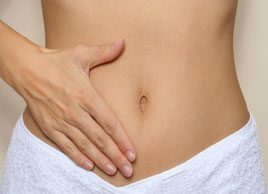3 ways to relieve PMS symptoms
Alleviate PMS symptoms such as pain, bloating and irritability with these drugstore remedies

Source: Best Health Magazine, November/December 2009
It’s the week before your period. You’re grouchy and tired, and suddenly you can’t button up your pants. Sound familiar? Then you’re among the vast majority of Canadian women (up to 90 percent) who feel premenstrual symptoms.
Most PMS sufferers get symptoms that don’t interfere with our lifestyle, such as breast tenderness, bloating and a mild headache’these tell you you’re about to get your period, says Dr. Robert L. Reid, professor of obstetrics and gynecology at Queen’s University in Kingston, Ont. (This milder form of PMS is called molimina.)
Although the exact cause is unknown, such symptoms are thought to be triggered by fluctuations in hormones and the brain chemical serotonin, and can also involve mood swings, fatigue, water retention and insomnia. Premenstrual symptoms can persist for the duration of menstruation; many of us also experience abdominal cramping just before and during our periods.
About three to five percent of women experience severe PMS symptoms that disrupt activities and relationships. Psychiatrists refer to the condition’which manifests as depression, lethargy or anger, and hinders daily life’as premenstrual dysphoric disorder (PMDD). If you think you could have PMDD or severe PMS, talk to your doctor.
So long as your premenstrual symptoms are mild to moderate, the good news is that you can manage with over-the-counter products, which can help both before and during your period. In fact, says Reid, ‘it’s estimated that 30 to 40 percent of affected women will look for over-the-counter remedies.’ Here are some options for you to consider.
1. To alleviate body aches and pains
Example: Tylenol Muscle Aches & Body Pain
How it works: Tylenol contains acetaminophen, a drug that elevates the body’s pain threshold. Tylenol caplets work in two steps: The first layer works to provide quick relief, while the second one is time-released to reduce pain for up to eight hours.
Need to know: ‘Take it at the onset of pain and with food,’ says Janina Filipczuk, a pharmacist at Hooper’s Pharmacy in Port Credit, Ont. ‘As long as you follow the directions on the package, it’s safe and free of side effects.’ It’s also recommended for those allergic to acetylsalicylic acid (found in Asprin).
2. To reduce pain, bloating and breast tenderness
Examples: Aleve, Advil, Motrin IB, Tylenol Menstrual and Extra Strength Midol Menstrual Complete
How they work: Naproxen sodium (the active ingredient in Aleve) and ibuprofen (found in Advil and Motrin IB) lower prostaglandins’chemicals that mediate pain and inflammation. This helps relieve pain, bloating and breast tenderness. (Acetylsalicylic acid, found in Aspirin, works similarly but can interfere with blood clotting, so avoid
it if you get heavy bleeding.) The menstrual formulas from Tylenol and Midol both have the painkiller acetaminophen, and they also contain diuretics to relieve bloating, water weight gain and breast tenderness.
Need to know: Naproxen sodium and ibuprofen are also considered safe when taken as directed. Cutting down on salt, salty foods and refined carbohydrates also helps prevent bloating.
3. To lessen irritability and tension
Examples: Extra Strength Midol PMS Complete, magnesium and vitamin B6
How they work: Midol contains acetaminophen to relieve pain, plus pamabrom (a diuretic) to decrease bloating. It also has the antihistamine pyrilamine maleate, which soothes tension and irritability. ‘Additional supplementation with vitamin B6 and magnesium may have beneficial effects on mood swings and irritability,’ says Filipczuk.
Need to know: Midol is considered safe when taken as directed. You should talk to your doctor or pharmacist before you take vitamin supplements to ensure they won’t interact with any medications. A dietitian can determine whether you’re getting enough vitamin B6 and magnesium from food. If you’re not, start with 50 to 100 mg of vitamin B6 and 250 mg of magnesium daily.
Prescription options
For severe PMS or PMDD symptoms, oral contraceptives can help level out hormonal fluctuations, says Reid. The most effective, he says, are pills such as Seasonale and Seasonique (which limit menses to four times a year) as well as those that contain the progestin drospirenone, which in clinical trials has alleviated PMDD. Antidepressants such as Zoloft and Prozac work on depression, anger and anxiety by raising serotonin (the brain’s ‘happy’ hormone).
This article was originally titled "Ease your P.M.S.," in the November/December 2009 issue of Best Health. Subscribe today to get the full Best Health experience’and never miss an issue!’and make sure to check out what’s new in the latest issue of Best Health.




